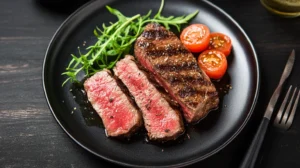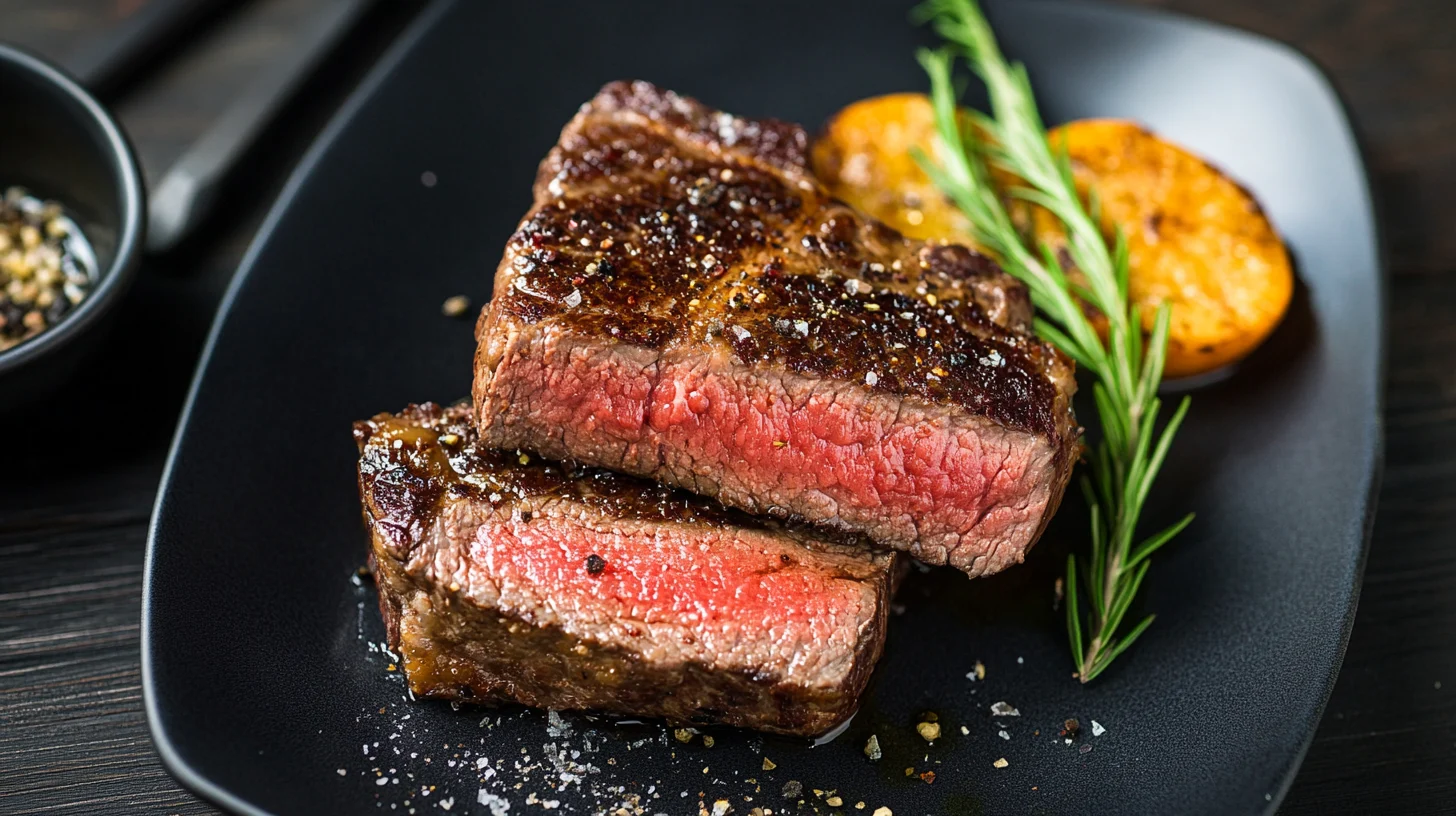Wagyu beef is often associated with indulgence and luxury, but many people wonder if it’s a healthy choice. The answer lies in its unique fat composition, nutrient profile, and how it fits into a balanced diet.
Health Benefits of Wagyu Beef
High in Healthy Fats
Wagyu beef is renowned for its marbling, which is composed primarily of monounsaturated fats (MUFAs). These fats are considered heart-healthy and offer several benefits:
- Lower Cholesterol Levels: Monounsaturated fats can help reduce LDL (“bad”) cholesterol while increasing HDL (“good”) cholesterol.
- Rich in Omega-3 and Omega-6 Fatty Acids: These essential fats support brain health, reduce inflammation, and promote heart health.
2. Lower Saturated Fat Compared to Regular Beef
While Wagyu beef does contain saturated fat, much of it is stearic acid, which has a minimal effect on raising cholesterol levels compared to other saturated fats.
3. Nutrient-Rich Profile
Wagyu beef provides essential nutrients, including:
- Protein: Helps build and repair muscles.
- Iron: Supports oxygen transport in the body and prevents anemia.
- B Vitamins: Important for energy production, metabolism, and maintaining a healthy nervous system.
- Zinc: Boosts immunity and aids in wound healing.
4. Easy to Digest
The finely marbled fat in Wagyu beef melts at a lower temperature, making it easier to digest compared to leaner beef.

Health Considerations
High-Calorie Content
The luxurious marbling in Wagyu beef makes it more calorie-dense than leaner cuts of beef. Moderation is key to avoid consuming excess calories, especially if weight management is a concern.
Portion Control is Important
Due to its richness, smaller portions of Wagyu beef are typically satisfying. A 4-ounce serving is often enough to enjoy the flavor without overindulging.
Sodium in Processed Wagyu Products
Some Wagyu burgers or processed items may contain added sodium or preservatives. Opt for fresh, high-quality Wagyu cuts to maximize health benefits.
How to Enjoy Wagyu in a Healthy Way
Cook Without Excess Fat: Wagyu doesn’t require additional oil or butter for cooking because of its natural marbling.
Pair with Healthy Sides: Complement Wagyu with steamed vegetables, whole grains, or a fresh salad to balance the meal.
Choose High-Quality Wagyu: Look for authentic Wagyu from trusted sources, as it often has a superior nutrient profile compared to lower-grade beef.
Is Wagyu Healthier Than Regular Beef?
Wagyu beef, renowned for its marbling, tenderness, and flavor, is often considered a luxurious alternative to regular beef. But is it healthier? The answer depends on how you define “healthy” and the context of your dietary needs. Let’s explore the nutritional and health aspects of Wagyu compared to regular beef.
Fat Content
Higher in Fat:
Wagyu beef is celebrated for its intense marbling, which results from a high intramuscular fat content. While this gives Wagyu its signature melt-in-your-mouth texture, it also means it contains more fat than most cuts of regular beef.
Healthier Fat Profile:
The fat in Wagyu beef consists largely of monounsaturated fats (MUFA), which are considered heart-healthy. These fats can help lower bad cholesterol (LDL) and raise good cholesterol (HDL) when consumed in moderation. Wagyu also has a higher proportion of omega-3 and omega-6 fatty acids compared to regular beef, which are essential for brain and heart health.
Calorie Content
Due to its higher fat content, Wagyu beef tends to be more calorie-dense than regular beef. For example, a 3.5-ounce (100-gram) serving of Wagyu can contain upwards of 300 calories, while the same amount of lean regular beef might have closer to 200 calories.
Protein Content
Both Wagyu and regular beef are excellent sources of high-quality protein, which is crucial for muscle repair, immune function, and overall health. The protein content in Wagyu is comparable to that in regular beef, but Wagyu’s higher fat content can slightly dilute the percentage of protein per serving.
Cholesterol Levels
Wagyu’s fat composition, being rich in monounsaturated fats, may have a less harmful effect on cholesterol levels compared to saturated-fat-heavy cuts of regular beef. However, the overall cholesterol content in Wagyu is similar to that of regular beef, so individuals with cholesterol concerns should still consume it in moderation.
Digestibility
Wagyu’s marbled fat contributes to its tender texture, which may make it easier to digest compared to tougher cuts of regular beef. This can be an advantage for those who experience difficulty digesting dense or fibrous meats.
Nutritional Balance
Both Wagyu and regular beef provide essential nutrients like iron, zinc, and B vitamins (especially B12). These nutrients support energy production, immune health, and red blood cell formation. However, the higher fat content in Wagyu may not suit those who need to limit their fat intake for medical or dietary reasons.
Portion Sizes Matter
Wagyu is richer and more flavorful than regular beef, often leading to smaller portion sizes. This can indirectly promote healthier eating habits, as a modest serving can satisfy cravings without excessive caloric intake.

Final Thoughts
Wagyu beef can be a part of a healthy diet when enjoyed in moderation and prepared thoughtfully. Its unique fat composition and nutrient density make it a luxurious yet potentially health-conscious choice. Pair it with balanced sides and savor it as an occasional treat for the best results.
Comparing Wagyu Beef to Other Proteins
When considering the health aspects of Wagyu beef, it’s helpful to compare it to other popular protein sources. This highlights its strengths and where it fits into a balanced diet.
1. Wagyu Beef vs. Regular Beef
- Fat Composition: Wagyu has significantly more monounsaturated fats and omega-3 fatty acids compared to regular beef, making it a healthier choice for heart health.
- Calories: Wagyu is more calorie-dense due to its marbling, so smaller portions are recommended.
- Digestibility: Wagyu’s tender texture and lower melting point fats make it easier to digest than some leaner cuts of regular beef.
2. Wagyu Beef vs. Chicken
- Protein Content: Chicken is leaner and lower in calories, making it a better option for weight loss diets.
- Fat Quality: Wagyu’s fats are healthier than the saturated fats found in dark chicken meat or skin, providing more heart-healthy benefits.
- Nutrient Density: Wagyu offers more iron and B vitamins than chicken, which are essential for energy and oxygen transport.
3. Wagyu Beef vs. Fish
- Omega-3 Levels: Fatty fish like salmon or mackerel are still the best sources of omega-3 fatty acids, surpassing Wagyu.
- Sustainability: Fish is often promoted for its environmental benefits compared to beef, including Wagyu.
- Cooking Versatility: Wagyu’s richness makes it better suited for indulgent meals, whereas fish is a lighter option for regular consumption.
Balancing Wagyu in Your Diet
1. Enjoy Wagyu as a Treat
Wagyu beef is a luxurious food that’s best enjoyed on special occasions. Incorporating it as a treat meal ensures you savor its benefits without overindulging in calories.
2. Include a Variety of Proteins
Pairing Wagyu with lean proteins like chicken, turkey, or tofu throughout the week ensures you get a diverse range of nutrients without relying solely on one source.
3. Monitor Portion Sizes
A typical Wagyu serving can be as small as 3-4 ounces, which is enough to enjoy its rich flavor without exceeding your daily calorie needs.
Environmental and Ethical Considerations
In addition to health factors, it’s worth noting the ethical and environmental impact of Wagyu beef.
1. Ethical Farming Practices
Authentic Wagyu beef is often produced under strict animal welfare standards, ensuring the cattle are well-fed, stress-free, and humanely treated. These practices contribute to Wagyu’s superior quality.
2. Environmental Impact
Like all beef, Wagyu production has a higher carbon footprint compared to plant-based or leaner animal proteins. Sustainable farming practices and smaller portion sizes can help mitigate the impact.
Final Tips for Healthy Wagyu Enjoyment
Wagyu beef, known for its luxurious marbling and unmatched tenderness, is a delicacy that many savor with great enthusiasm. While its rich flavors make it irresistible, it’s important to enjoy Wagyu responsibly to balance indulgence with health. Here are some final tips to help you relish Wagyu while keeping your well-being in mind:
1. Choose the Right Cut
Wagyu beef offers a variety of cuts, each with a unique marbling profile. Opt for leaner cuts like sirloin or tenderloin if you’re watching your fat intake, as they contain slightly less fat compared to richer cuts like ribeye. Balancing your portion size with your nutritional needs ensures you can enjoy Wagyu without overindulging.
2. Focus on Portion Control
A little goes a long way with Wagyu due to its intense richness. A typical serving of Wagyu can be smaller than conventional beef because of its flavor density. A 3-4 ounce portion is often sufficient to satisfy your taste buds while maintaining a balanced meal.
3. Cook It Right
Cooking Wagyu requires a delicate approach to preserve its flavor and nutritional value. Use low to medium heat and avoid overcooking, as this can render the fat excessively and diminish its quality. Grilling, pan-searing, or sous-vide are excellent techniques for achieving optimal tenderness and flavor.
4. Pair with Nutrient-Dense Sides
Complement your Wagyu with sides rich in nutrients and fiber, such as roasted vegetables, leafy greens, or whole grains. These accompaniments not only add balance to your meal but also help offset the richness of the beef, promoting better digestion and a more satisfying dining experience.
5. Use High-Quality Seasoning
Wagyu’s natural flavor shines with minimal seasoning. A sprinkle of sea salt, freshly ground black pepper, or a hint of garlic can enhance its taste without overpowering the beef’s unique profile. Avoid heavy sauces or marinades that may mask the delicacy of the Wagyu.
6. Mind Your Frequency
While Wagyu is a treat for the senses, it’s best enjoyed occasionally rather than as a regular staple. Its high fat content, while composed of beneficial monounsaturated fats, can contribute to calorie intake if consumed frequently. Reserve Wagyu for special occasions to savor its luxury guilt-free.
7. Stay Hydrated
The richness of Wagyu can sometimes leave you feeling heavy, especially if consumed in large amounts. Drinking plenty of water before and after your meal aids in digestion and helps maintain overall hydration.
8. Savor the Experience
Wagyu is meant to be savored slowly. Take your time to appreciate the texture, aroma, and melt-in-your-mouth quality. Eating mindfully not only enhances your enjoyment but also prevents overeating.
9. Explore Different Preparations
Expand your Wagyu experience by trying different culinary styles, such as shabu-shabu, sukiyaki, or teppanyaki. Each method brings out unique aspects of Wagyu’s flavor and texture, adding variety to your indulgence.
10. Learn the Source
Lastly, ensure you’re purchasing authentic Wagyu from reputable sources. Genuine Wagyu, especially those with certifications like Kobe or Matsusaka, guarantees a higher standard of quality and traceability.
By following these tips, you can indulge in the exquisite luxury of Wagyu beef while maintaining a healthy and balanced lifestyle. Bon appétit!
Conclusion: Is Wagyu Beef Healthy?
Wagyu beef is a unique and luxurious protein that can be part of a healthy diet when enjoyed in moderation. Its superior fat quality, nutrient richness, and digestibility make it a better choice compared to many other beef options. However, due to its calorie density and environmental considerations, it’s best consumed as an occasional treat paired with healthy sides.
By balancing indulgence with thoughtful preparation and portioning, Wagyu can offer both culinary delight and nutritional benefits.

